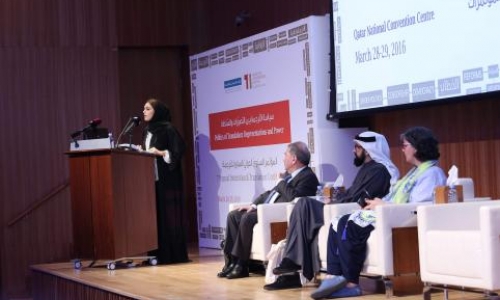Over 200 attend first day of Hamad Bin Khalifa University’s “Politics of Translation” Conference

Hamad Bin Khalifa University’s College of Humanities and Social Sciences (CHSS) opened the first day of its seventh annual international translation conference on the “Politics of Translation: Representations and Power” with over 200 in attendance. The event’s keynote addresses, panels and workshops highlighted the crucial role translation plays in an increasingly globalized world as a powerful instrument often used to shape a narrative, the portrayal of an event, or a current situation.
Dr. Amal Al-Malki, Dean of HBKU’s CHSS, commented on the importance of the field of translation and interpreting in her opening remarks. She noted: "This translation conference, which started seven years ago as a small intellectual gathering, has become a yearly reference for academics, media specialists and diplomats, as well as the general public. This year’s theme “Politics of Translation: Representations and Power” has resonated positively with the academic and professional communities and has proven yet again that the fields of translation and interpreting are interdisciplinary and span any field that has a human component to it.”
"Politics have played a role in this year’s conference. The unfortunate events of Belgium last week and the closure of the airport have made us both anxious and adamant in having our panelists from Belgium join us. Out team has worked closely on their travel logistics and I am very happy to say that our colleagues from Belgium are here with us today."
The conference brings local and international scholars, political commentators, media personalities, and the general public together to discuss some of the most critical challenges in the field. Keynote speakers included, Dr. Henri Awaiss, Dean of the Faculty of Languages of Saint Joseph University –Beirut, Dr. Joselia Neves, Associate Professor at Hamad Bin Khalfia University, and Sultan Sooud Al Qassemi, a well-known columnist and commentator on Arab affairs based in the United Arab Emirates, previously listed in Arabian Business as one of the World’s 100 Most Powerful Arabs in the “Thinkers” category.
Al Qassemi said: “It’s been five years since I had a small role in translating some of the events that occurred during the Arab Spring. I’ve never been asked to speak about that experience until now and it has really been a journey of self-discovery.”
“It is interesting to hear what other professionals have to say about the politics of translation and the translation of politics. Doha is a great place to hold this conference, with participants here from around the world including countries with varied political systems such as China, Iran, and many of the Arab States, able to discuss this issue and speak about their experiences translating major political events.”
The first day of the conference continued with attendees engaging in simultaneous panel discussions, covering topics such as the politics of gender in translation, interpreting conflicts, and literary representations of power. Speakers from Qatar, Egypt, Spain, the United Kingdom, Portugal, China, Iran, Turkey, Belgium, Switzerland, Saudi Arabia, Morocco, Algeria, Canada and the United States participated, with the conference organizers selecting 32 abstracts from the over 100 submitted.
Day two of the conference will explore topics such as translating the religious, ethical questions that emerge when covering political issues, and the linguistic perspective on political translation. It will also feature a closing session with keynote speakers and special guests, including Dr. Ahmed Albanyan, Dean of the Institute of Translation and Arabization (TAI) at the Imam Muhammad ibn Saud Islamic University in Saudi Arabia, Dr. Huda Moukannas, Professor at the Lebanese American University, and Dr. Hannelore Lee-Jahnke, professor from the University of Geneva - sharing reflections and major takeaways from the event.
A series of workshops are also being offered in an effort to emphasize the crucial link between theory and practice with Dr. Mahmoud Al-Batal, Professor of Arabic at the University of Texas, Austin and co-author of the well-known Arabic textbook series Al-Kitaab, leading a session on The Teaching of Writing in Arabic: Process, Product, and Assessment this year.
The impressive line-up of speakers at the 2016 conference, as well as its popularity among the community in Qatar, evidences the growth and development of the annual event. In its seventh year, the conference has become the preferred Gulf-based platform for discussions in the field of translation and interpretation, drawing individuals from around the world to Qatar as HBKU continues to evolve and expand, guided by an aim to offer academic programs that serve local and regional needs.
Shaima Ziara, a student enrolled in HBKU's Master of Arts in Translation Studies program, commented: "The Seventh Annual Translation Conference is a great opportunity for the students of the College of Humanities and Social Science to be exposed to a professional academic environment and explore the different approaches and conditions of translation. The conference offers students such as myself the opportunity to learn from experts working in various fields through the different panels and workshops that cover a wide range of topics."
To learn more about Hamad Bin Khalifa University and its offerings for the 2016-2017 academic year, please visit http://www.hbku.edu.qa/.








